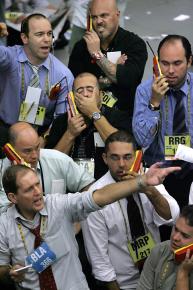Behind the faceless free market
Irish socialist looks at who exactly is setting financial policies in the UK--and how they profit from it.
WHO ARE the markets? It seems they are hovering in the heavens, glowering above us, making ready to deliver from on high their no-nonsense judgment on whether the imminent cuts in government spending go deep enough. If they don't, an awful wrath will plague the land.
Put spending on Accident and Emergency services before appeasing the markets, and the new administration will be a dead duck before it has learned to waddle. How close to the bone will the cuts have to be to satisfy the markets? As ever, the markets maintain a grim silence on this one.
But the Con-Dems had better not come up short if they know what's good for them. What's good for the rest of us is irrelevant.
The Financial Times reported that the London International Financial Futures and Options Exchange was set to open at 1 a.m. on May 7--three hours after the close of the polls--to allow traders to decide whether, in light of the outcome, they should buy or sell government bonds. They found the indecisive result very irritating.
The following day, as maneuvering for the tenancy of 10 Downing Street maundered on, Brian Hilliard of investment bank Societe Generale told the Daily Mail: "Time is running out fast. The markets have no appetite for political horse-trading. They are demanding decisive action."
Top business people weren't happy bunnies, either. Sir Martin Sorell, chief executive of WPP, suggested that the outcome was "the worst possible result."
Hung parliaments didn't lend themselves to tough action on spending and so didn't encourage "confidence." The confidence of the markets, he meant.
WPP is a global advertising and communications company, with 400 offices in 107 countries. Reported revenue for 2008--the last year for which I could find full figures--was $10.8 billion. Sir Martin holds shares worth $100 million. His "remuneration package" last year--salary plus "long-term incentive awards"--came to $27 million.
Still, the company must be paying a fortune in tax, considerably boosting government revenues? Wrong. WPP has moved its headquarters to New Jersey while simultaneously establishing "tax residency" in the Republic, so as to escape "punitive" UK rates. The move has saved the company up to $287 million. Or, deprived the state of up to $287 million.
NONE OF this deters Sir Martin from pronouncing on the way the taxes the rest of us pay should be spent. Bailing out banks good, refurbishing schools bad. Meanwhile, Arnaud Mares of Moody's, one of the world's three leading credit-rating agencies, warns the incoming Treasury team against any temptation to backslide.
Their duty is to "muster convincing parliamentary support for a fiscal adjustment," or else Britain's credit rating will plummet as the markets conclude that the Brits haven't the stomach to swallow the medicine. Even when the markets show themselves risibly incompetent and plunge the economy into all manner of mayhem, they'll brook no impertinence from elected representatives.
In the U.S., Leman Brothers, Bear Sterns, Washington Mutual and others went to the wall. Citigroup and Bank of America remained standing, just about, propped up by huge piles of money provided by the state--aka the taxpaying public.
In Britain, tens of billions were pumped into the Royal Bank of Scotland and HBOS-Lloyds TSB, giving the state majority shares. Northern Rock and Bradford and Bingley had already, effectively, been nationalized. Did the surviving behemoths shuffle up to the governments, downcast with embarrassment, promising never to misbehave in this manner again, swearing, hand on trembling heart, to pay back every penny if only the state could see its way to advance another zillion to tide them over the worst?
No. They pocketed the taxpayers' dosh and demanded that market forces be allowed to rip on regardless.
So who are the markets? They are that thin layer of men who make billions manipulating and betting on the prices of everything from nuclear waste to vegetable oil, but mainly of money itself.
When Cameron, Clegg, Osborne and the rest of Britain's new political brat pack talk of restoring confidence to the markets, what they mean is reassuring this class of unproductive oiks that there'll be no restraint on them skimming off the world's wealth.
Is there anything can be done? There is. Clearly, governments won't do it. What could prove toxic for the braying oiks is the pungent aroma on the streets of Athens wafting its way across the continent.
First published in the Belfast Telegraph.



